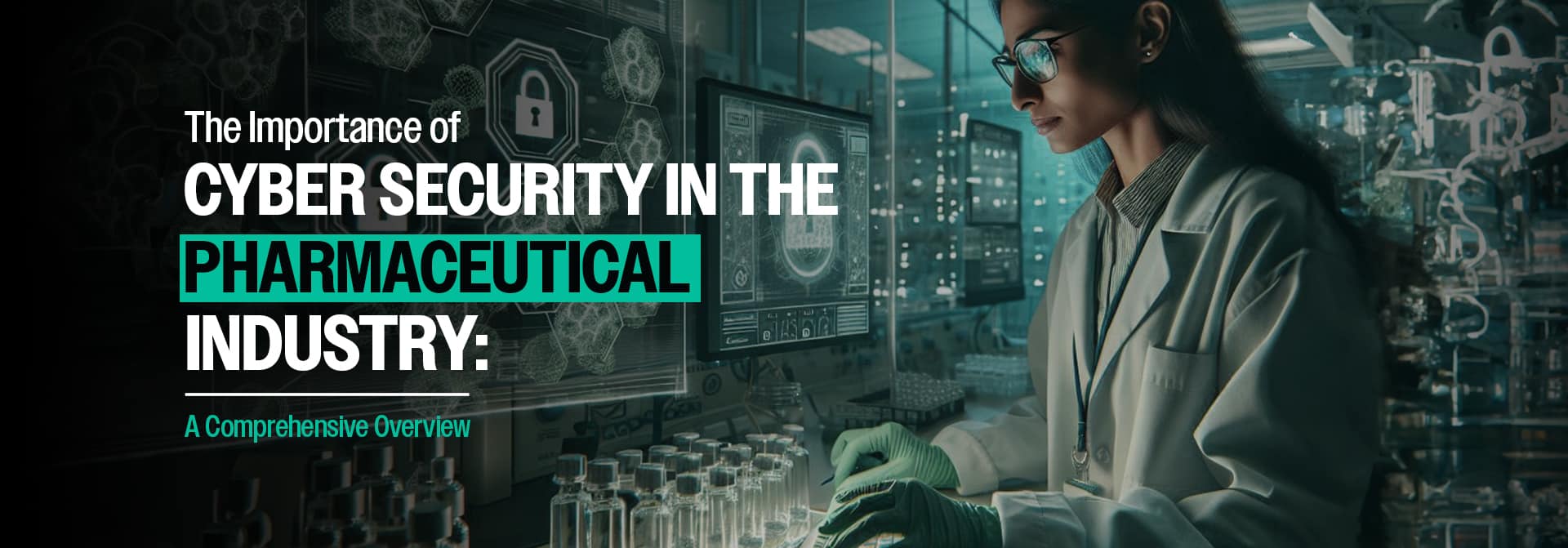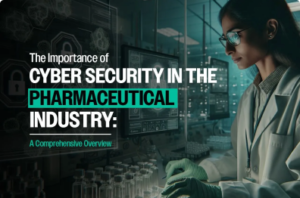

The Importance of Cyber Security in the Pharmaceutical Industry: A Comprehensive Overview
Ever wonder why the pharmaceutical sector finds cybersecurity such a pressing issue? When you stop to consider it, pharma businesses are sitting on a gold mine of data; hackers target research data, intellectual property (IP), patient records, and medical equipment most of all. Based on IBM’s Cost of a Data Breach Report, cyberattacks in the healthcare industry skyrocket by 58% in 2023 alone. Cybersecurity is not only a need given the complexity of pharma operations and mounting threats; it is a must.
Let us explore the reasons now.
Emerging Cybersecurity Concerns in the Pharmaceutical Sector
Digital transformation is not foreign to pharmaceutical companies. The sector is fast changing from cloud-based storage to AI-driven pharma research. But enormous responsibility follows great invention.
Online weaknesses
Nowadays, many pharmaceutical companies depend on linked digital systems including solutions for medical device cybersecurity. Often linked to the internet for real-time data, these gadgets provide major hazards if left unattended. One weakness in a linked gadget might provide hackers with access, therefore compromising systems all around.
Value Target High
Why are cybercrime zeroing in this sector? Simple, really Pharma has very precious assets. We are discussing private medicine formulations, sensitive R&D data, and patient information valued in millions of black-market dollars. These thieves understand that a hack in a drug company may compromise operations, stop research, or even result in stolen intellectual property, therefore endangering years of labour.
Supply Chain Vulnerabilities
Globally, the pharma supply chain comprises several distributors, suppliers, and contractors among other vendors. Should even one third-party vendor’s cybersecurity policies be inadequate, the whole chain is vulnerable. This was underlined in a 2020 Deloitte report showing that third-party vulnerabilities caused 60% of pharmaceutical companies to suffer cyberattacks.
Main Cybersecurity Risks Affecting the Pharmaceutical Sector
What then are the main hazards pharma now faces? Let’s dissect them.
Data Crises
Particularly regarding private patient information and proprietary research data, data breaches cause great worry. Actually, a Verizon study indicates that 43% of breaches in 2022 aimed at healthcare companies. One of the most vulnerable sectors is the pharmaceutical one as the data they possess is sensitive and profitable.
IP Violation
New drug development by pharmaceutical companies’ costs billions of dollars. One IP theft might destroy years of study, therefore providing rivals or thieves access to extremely private data. Recall the 2020 AstraZeneca hack when cyber attackers sought to pilfers COVID-19 vaccine research? That only scratches the surface.
Attack on Ransomware
The drug industry is still rife with ransomware. ransomware attacks rose by 20% in the healthcare sector by 2022. These strikes can disable important systems, stop medicine manufacturing, and cause significant financial losses. Not to add the possible harm to the reputation of your business should you have to pay a ransom.
Insider Danger:
Sometimes the biggest dangers originate inside. Workers can compromise private information whether they are negligent or motivated maliciously. Research by IBM indicates that insider threats account for 23% of cyber events in 2023, so internal breaches are becoming more and more of an industry’s rising issue.
Third-Party Hazards
Research partners, producers, and contractors are three areas the pharma sector mostly depends upon. Any one of these third parties might bring catastrophe with a breach. Actually, according to Ponemon Institute, 65% of businesses suffered a data breach resulting from their supplier chains by 2022. Third-party risk management has obviously to be a top priority in pharma’s cybersecurity plan.
Cyber Attacks’ Effects on the Pharmaceutical Sector
When a pharma company suffers a cybercrime, what follows?
Monetary Disaster
A data breach is costly, not only a PR horror. Based on IBM’s Cost of a Data Breach Report, the average cost of a healthcare data breach in 2023 was $10.93 million—a number that is only rising. That excludes legal fees, missed research time, or even ransom payments.
Control Fines
Operating under tight rules like HIPAA and GDPR, which demand them to safeguard private information, pharmaceutical businesses are A breach may result in big fines. As to Deloitte, 65% of healthcare companies actually suffered compliance fines after a cyber incident last year.
Negative Damage to Reputation
Trust is difficult to rebuilt once a breach occurs. Based on Forrester Research, a stunning 60% of patients are probably going to change providers following a data hack. This loss of trust can also affect pharmaceutical businesses’ relationships to investors and partnerships.
Research and Development Delay
Cyberattacks can cause R&D to stop dead cold. Cybercriminals may pilfer priceless formulas, patents, or medication research from IP theft on the rise, maybe turning them over to rivals. R&D delays translate into delays in putting life-saving medications onto the market.
Why is a strong cybersecurity strategy very vital?
Given the enormous stakes, a rock-solid cybersecurity plan is non-negotiable. Let’s investigate the causes now.
Preserving Intellectual Property
The bloodline of your pharmaceutical company is your IP. Whether it’s patent information, clinical trial data, or medicine formulations, losing that to a cybercriminal may years-back your business. Crucially, investments in healthcare cybersecurity solutions with an eye on data encryption and improved threat detection
Ensuring compliance safeguards patient privacy, not only helps to prevent fines. Pharma companies have to follow strict data security rules whether it’s HIPAA in the United States or GDPR in Europe. Using cybersecurity standards such as ISO 27001 can help to guarantee your constant compliance and audit ready state.
Operations Continuity Safeguarding
Not only does the IT division suffer when ransomware attacks. Clinical studies, drug manufacture, even supply networks can all stop. A strong incident response strategy can make all the difference between a small disturbance and a full operational collapse.
Guarding Patient Privacy
First and most importantly is patient trust. Pharma corporations keep vast volumes of private patient information that, should it be hacked, might endanger patients and cause significant legal consequences. Regular audits, strong encryption, and healthcare cybersecurity solutions help to keep that data safe.
Best Strategies for Enhancing Cybersecurity in Pharmaceuticals
In pharma, you have to be on your A-game. Here is the process:
One of the main offenders behind data breaches is, quite naturally, human mistake. Crucially, phishing attempts, password security, and data handling should all be taught regularly in-depth. Verizon reports that 95% of breaches result from human error after all.
Modern Threat Detection
Real-time monitoring and detection of odd activity driven by artificial intelligence helps to stop breaches before they start. Your toolset should include healthcare cybersecurity solutions using machine learning to forecast and stop threats.
Encrypted Data
Sensitive data should be encrypted both at rest and in transit to make sure thieves cannot use it even should it be intercepted. Imagine it as an uncrackable code protecting your most valuable information.
Third-Party Safety Control
Edit your partners! Regular security audits of outside suppliers help to guarantee they follow your cybersecurity policies. Should one of them fall prey, your neck is on the line.
Plans of Incident Reaction
Though every attack cannot be stopped, you can be ready. Plans of incident response should be in place and routinely updated to guarantee swift and efficient reaction upon an attack.
Case Study: EMA Hack 2020
The 2020 hack of the European Medicines Agency (EMA) is one clear illustration of a significant cyber-attack in pharma. Targeting COVID-19 vaccination data, hackers raised general alarm. This incident underlined the need of pharma businesses tightening control on critical data and raising their cybersecurity effort.
Future developments in pharmaceutical cybersecurity
Artificial intelligence powered techniques from machine learning are transforming threat detection. Pharma businesses can predict and stop attacks depending on past data by applying machine learning techniques.
Blockchain in Pharmaceutics
One developing method to protect the pharmaceutical supply chain is blockchain technology. Its tamper-proof records and openness help to prevent fraudsters from bringing fake medications into the system.
Architectural Zero Trust
Zero trust models, in which no user—internal or external—is trusted by default, are being embraced by pharma companies. This guarantees several layers of protection, hence even if a hacker breaks one layer, others block them.
End
In the pharmaceutical sector, cybersecurity protects lives rather than only data. Now is the moment for pharma businesses to put thorough cybersecurity plans covering everything from medical device cybersecurity to third-party risk management in place as cyberthreats are rising. Recall: An ounce of prevention in cybersecurity is worth a pound of treatment. Here your anti-threat squad is to ensure you always one step ahead of the evil guys.














